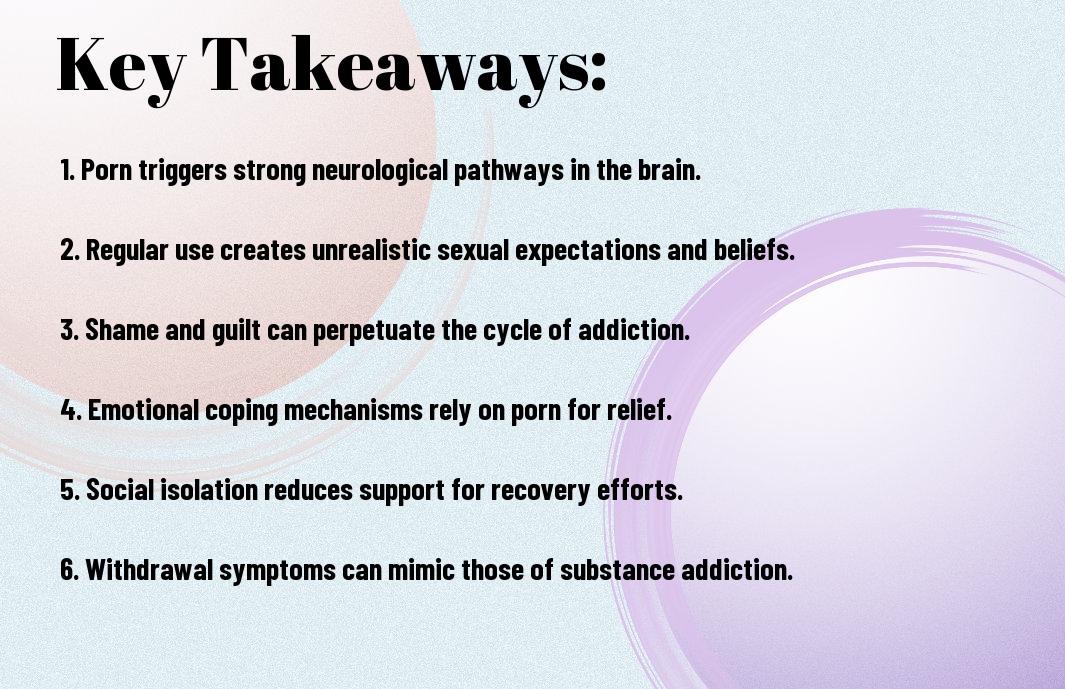Addiction to pornography can profoundly impact your life, creating a cycle that feels nearly impossible to break. The complexities of this addiction are influenced by various psychological and physiological factors that reinforce your habits, making it difficult to regain control. You may not realize how deeply entrenched these patterns can be, leading to feelings of shame, isolation, and despair. Understanding the reasons behind your struggle is the first step towards recovery and regaining a healthier relationship with your own sexuality.
Key Takeaways:
- Pornography addiction can create strong neural pathways in the brain, making it difficult for individuals to break free from compulsive behaviors.
- Emotional issues such as anxiety, depression, and low self-esteem often accompany porn addiction, complicating the recovery process.
- Access to pornography is more pervasive than ever, making it challenging to avoid triggers that lead to relapse.
- Support systems play a pivotal role; lack of understanding or stigma from peers and family can hinder open discussion and recovery efforts.
- Many may not fully recognize the extent of their addiction, leading to a lack of motivation to seek help or make changes.
- Shifting personal beliefs about sexuality and intimacy is necessary, as porn can distort perceptions and expectations in relationships.
- Recovery is often a non-linear process, with setbacks being a normal part of the journey that can discourage progress.

Understanding Porn Addiction
To truly comprehend porn addiction, you need to recognize that it is more than just a simple habit; it often stems from deeper emotional or psychological issues. It can become a compulsive behavior that interferes with your daily life, relationships, and personal well-being. Understanding this addiction requires an exploration of its underlying causes, impact, and the cycle of compulsive use that can be incredibly hard to break.
Definition and Scope
One important aspect of porn addiction is its definition and scope. It is characterized as a behavioral addiction where an individual becomes dependent on pornographic material to achieve sexual arousal. This dependency can disrupt your daily functions, affect your mental health, and damage intimate relationships.
Common Misconceptions
About porn addiction, many people believe it only affects certain individuals or stems from a lack of self-control. However, it is much more complex and can impact anyone, regardless of age or background.
Understanding these misconceptions is imperative because they can hinder your ability to approach the issue with the seriousness it deserves. You might think that porn addiction is merely about excessive viewing or lack of willpower, but in reality, it can involve psychological triggers and emotional disturbances that make recovery challenging. Confronting these beliefs can help you seek more effective support and solutions in overcoming your addiction.

The Psychological Impact
Some individuals who struggle with porn addiction experience significant psychological consequences. Frequent consumption can lead to distorted perceptions of intimacy and relationships, which may result in feelings of guilt, shame, and anxiety. These emotional struggles can make it challenging for you to connect with others, leading to isolation and further complicating recovery efforts.
Dopamine and Brain Chemistry
For many, the allure of porn is tied to its effect on dopamine release in the brain. This neurotransmitter is associated with pleasure and reward, making the experience of watching pornography intensely gratifying. Over time, your brain may become reliant on this artificial stimulation, diminishing your ability to find joy in everyday activities and creating a cycle that is hard to break.
Emotional and Social Consequences
Between feelings of isolation and an altered view of relationships, the emotional and social consequences of porn addiction can be profound. Struggling with addiction might impact your self-esteem and confidence, causing you to withdraw from friends and family. You may find it difficult to engage in healthy, meaningful relationships, leading to a vicious cycle of loneliness and reliance on porn as a substitute for genuine connection.
To navigate these challenges, you may need to confront the ways your addiction affects your emotions and social life. By addressing feelings of isolation and confronting your distorted views on intimacy, you can begin to understand the importance of nurturing real connections in your life. This process may involve seeking support from friends, family, or a mental health professional, allowing you to gradually rebuild your self-esteem and form healthier relationships. Recognition of these issues is a critical step in your recovery journey.

Behavioral Patterns
Not recognizing the behavioral patterns associated with porn addiction can hinder your recovery. These ingrained habits often manifest as compulsive viewing, even in inappropriate situations. Recognizing and addressing these patterns is crucial to break free from the cycle of addiction, as they reinforce your dependence on pornography as a coping mechanism or source of pleasure.
Triggers and Compulsions
Behavioral triggers often lead to compulsions that can hinder your progress. You may find specific situations or emotions serve as cues that push you toward seeking out porn. This cycle of triggering events and subsequent compulsive behavior reinforces the addiction, making it increasingly difficult for you to resist the urge.
Withdrawal Symptoms
Beside behavioral patterns, withdrawal symptoms pose a significant challenge during recovery. When you attempt to stop watching porn, you may experience irritability, anxiety, or mood swings. These symptoms can make it tempting to revert back to old habits, hindering your progress and making it hard to stay committed to your recovery journey.
With the withdrawal symptoms manifesting, you may feel a range of uncomfortable emotions, including restlessness or agitation. These reactions can vary in intensity depending on your level of addiction. It’s important to acknowledge these feelings as part of the recovery process and to develop coping strategies to manage them effectively, ensuring you have the tools necessary to navigate this challenging phase.

The Role of Shame and Guilt
All too often, you may find yourself grappling with intense feelings of shame and guilt as you navigate the journey of porn addiction recovery. These emotions can create a painful cycle, making it even harder to break free from the habits that hold you captive. Instead of viewing your addiction as a struggle to overcome, you might internalize these feelings, leading to further isolation and secrecy. Understanding this dynamic is important to fostering a healthier mindset as you work towards recovery.
Internal Struggles
Behind every instance of porn addiction lies a personal battle with internal struggles. You may wrestle with feelings of worthlessness or self-loathing, leading to a desire to escape through pornography. These internal conflicts not only exacerbate your addiction but also hinder your ability to seek help, trapping you in a cycle of self-doubt and desperation.
Stigmatization in Society
Beside your internal struggles, societal stigmatization plays a significant role in complicating your recovery journey. You may feel hindered by the fear of judgment and misunderstanding from those around you, making it hard to open up about your addiction. This societal pressure can further entrench feelings of shame and isolation.
Plus, the stigmatization of porn addiction in society compounds your emotional struggles. You might perceive that others view your addiction as a moral failing, which can intensify your need to hide your experiences. This societal judgment not only impedes your openness to seeking support but also reinforces the sense of shame that often accompanies addictive behaviors. Realizing that you are not alone and that many others face similar struggles can be a vital step towards breaking free from this cycle of guilt and shame.
Recovery Challenges
Many individuals facing porn addiction encounter a myriad of recovery challenges that complicate their journey toward healing. These challenges can stem from personal beliefs, emotional struggles, and societal perceptions surrounding addiction. Understanding the complexities involved in recovery is imperative for you to navigate this path effectively.
The Cycle of Relapse
Below the surface, a cycle of relapse often ensnares you as you attempt to break free from porn addiction. It starts with triggers, leading to an emotional response that compels you to seek relief through pornography, reinforcing the addictive behavior. Each relapse can deepen feelings of shame and guilt, making it increasingly difficult to regain your footing.
Lack of Support Systems
After recognizing the need for change, you may find that a lack of support systems can significantly hinder your recovery. The absence of a supportive community or understanding friends can leave you feeling isolated and helpless, making it more challenging to resist the pull of addiction.
Further, seeking help often requires vulnerability, which can be intimidating without adequate support. You might find it beneficial to reach out to others who understand your struggle, whether through support groups, therapy, or trusted friends. Establishing a network of encouragement can provide you with the accountability and camaraderie necessary to navigate the difficult moments in your recovery journey.
Effective Recovery Strategies
Now that you understand the challenges of overcoming porn addiction, it’s time to explore effective recovery strategies that can guide you on your journey. This process involves various therapeutic methods and the cultivation of healthy habits that support lasting changes in your life. By integrating these approaches into your routine, you can build a solid foundation for your recovery and develop a more fulfilling lifestyle.
Therapeutic Approaches
Recovery from porn addiction often benefits from therapeutic approaches that address underlying issues and help you understand your behaviors. Cognitive-behavioral therapy (CBT) is particularly effective as it teaches you to identify and change negative thought patterns. Participating in group therapy or individual counseling can also provide support through shared experiences, helping you find new coping strategies and discover healthier outlets for your emotions.
Building Healthy Habits
For a sustainable recovery, building healthy habits is necessary. Establishing routines that promote physical and mental well-being can help you create a supportive environment that discourages relapse. You should focus on incorporating activities that bring you joy, such as exercise, hobbies, or mindfulness practices, which can replace the time previously spent on pornography and ultimately foster a more balanced lifestyle.
Effective building of healthy habits requires you to consciously engage in behaviors that reinforce your commitment to recovery. Start by setting achievable goals related to physical activity, stress management, or social interactions. Surround yourself with supportive individuals who inspire you to stay on track, and prioritize self-care activities that nurture your well-being. Over time, these habits will not only replace your addiction but will also enhance your quality of life.
Final Words
Considering all points, recovering from porn addiction is particularly challenging due to the powerful neurological effects it has on your brain, coupled with societal stigmas and the potential for deep-seated emotional issues. This combination makes it difficult to break free from compulsive behaviors and find healthier coping mechanisms. Understanding your triggers and seeking professional help can make your journey easier. For further insights into the timeline of recovery, you may explore How Long Does it Take to Break a Porn Addiction?.
FAQ
Q: Why is porn addiction difficult to overcome?
A: Porn addiction can be difficult to overcome due to various factors, including the neurochemical changes it creates in the brain. Initial exposure to pornography can trigger a release of dopamine, a feel-good neurotransmitter. Over time, individuals may find themselves needing more intense stimulation to achieve the same pleasure, leading to a cycle that is hard to break.
Q: What role does shame play in porn addiction recovery?
A: Shame often serves as a significant barrier to recovery. Many individuals struggling with porn addiction may feel embarrassed or guilty about their behavior, which can prevent them from seeking help or discussing their challenges. This shame can increase isolation, making it harder to find supportive networks or interventions.
Q: Are there underlying psychological issues that contribute to porn addiction?
A: Yes, underlying psychological issues can contribute to porn addiction. Many individuals may turn to pornography as a coping mechanism for stress, anxiety, depression, or other mental health concerns. Addressing these underlying issues is often a key component in the recovery process.
Q: How does society’s view of pornography impact recovery?
A: Societal perceptions of pornography can impact recovery in various ways. In some cultures, pornographic material is normalized or even encouraged, making it harder for individuals to acknowledge their addiction. Conversely, a stigmatizing environment can increase feelings of shame and inhibit open discussion about the challenges of recovery.
Q: What triggers are commonly associated with porn addiction?
A: Common triggers for porn addiction can include stress, boredom, loneliness, and exposure to sexually explicit content. Recognizing and understanding these triggers is vital in developing effective coping strategies to avoid falling back into old habits and to build healthier routines.
Q: Can support groups be beneficial for someone recovering from porn addiction?
A: Yes, support groups can be highly beneficial for individuals recovering from porn addiction. These groups provide a safe space to share experiences, receive support, and learn from others who have faced similar challenges. Peer support can foster accountability and a sense of community, vital for maintaining recovery.
Q: What are some effective strategies for overcoming porn addiction?
A: Effective strategies for overcoming porn addiction may include setting clear personal goals, establishing healthy habits, seeking therapy, and utilizing tools like blockers or filters to manage exposure to pornography. Journaling about feelings and progress can also provide valuable self-reflection, aiding in the recovery journey.
